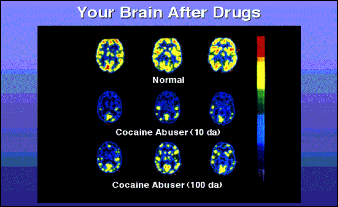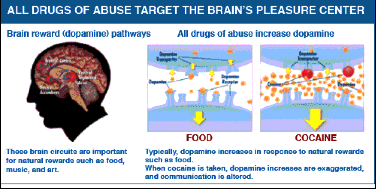Addiction literally mans being bound to, and such a condition is not just limited to physical disease or ailment, it takes over the entire body and mind of the affected person, who cannot function without appropriate help and support.
Any and all kinds of substances that enslave a person work their way through the brain. Drugs or alcohol or any other abusive substances are chemicals, they tap into the brain's communication system and interfere with the way nerve cells normally send, receive and process information.

The eccentric and happy effects of substance abuse are due to the large and rapid upsurges in dopamine, a neuro-chemical critical to stimulating feelings of pleasure and motivating behavior. Large exposure to drugs or harmful chemicals leads to the reduction in sensitivity of dopamine levels. So the person is unable to react to usual everyday stimuli. This disturbs the person's normal heirarchy of needs and desires and substitutes them with new priorities of excessive addiction.
Addiction to drugs also disturbs the brain circuits that deal with memory and rational behavior. This leads to the addict behaving in absurd manner, being over dramatic or clinically depressed. The brain's reward system is altered, which means that the memory of the previous reward or positive motivation like food or drugs or alcohol can trigger similar behavior, motivating the addict to engage in the same activity again.
Addiction leads to an alteration in the frontal cortex of the brain, so that the impulse control and judgement are affected. The frontal cortex is responsible for inhibiting impulses and delaying gratification. Since this area takes a considerable time to develop, any harmful activities done even during puberty or early adulthood can lead to addictive behavior.

Sources:
- http://www.health.harvard.edu/newsweek/The_addicted_brain.htm
- http://alcoholism.about.com/od/problem/a/Addiction-Is-A-Chronic-Brain-Disease.htm
- http://teens.drugabuse.gov/drug-facts/brain-and-addiction
- http://www.mhcinc.org/poc/view_doc.php?type=doc&id=48370&cn=1408
- http://science.education.nih.gov/supplements/nih2/addiction/guide/essence.htm


